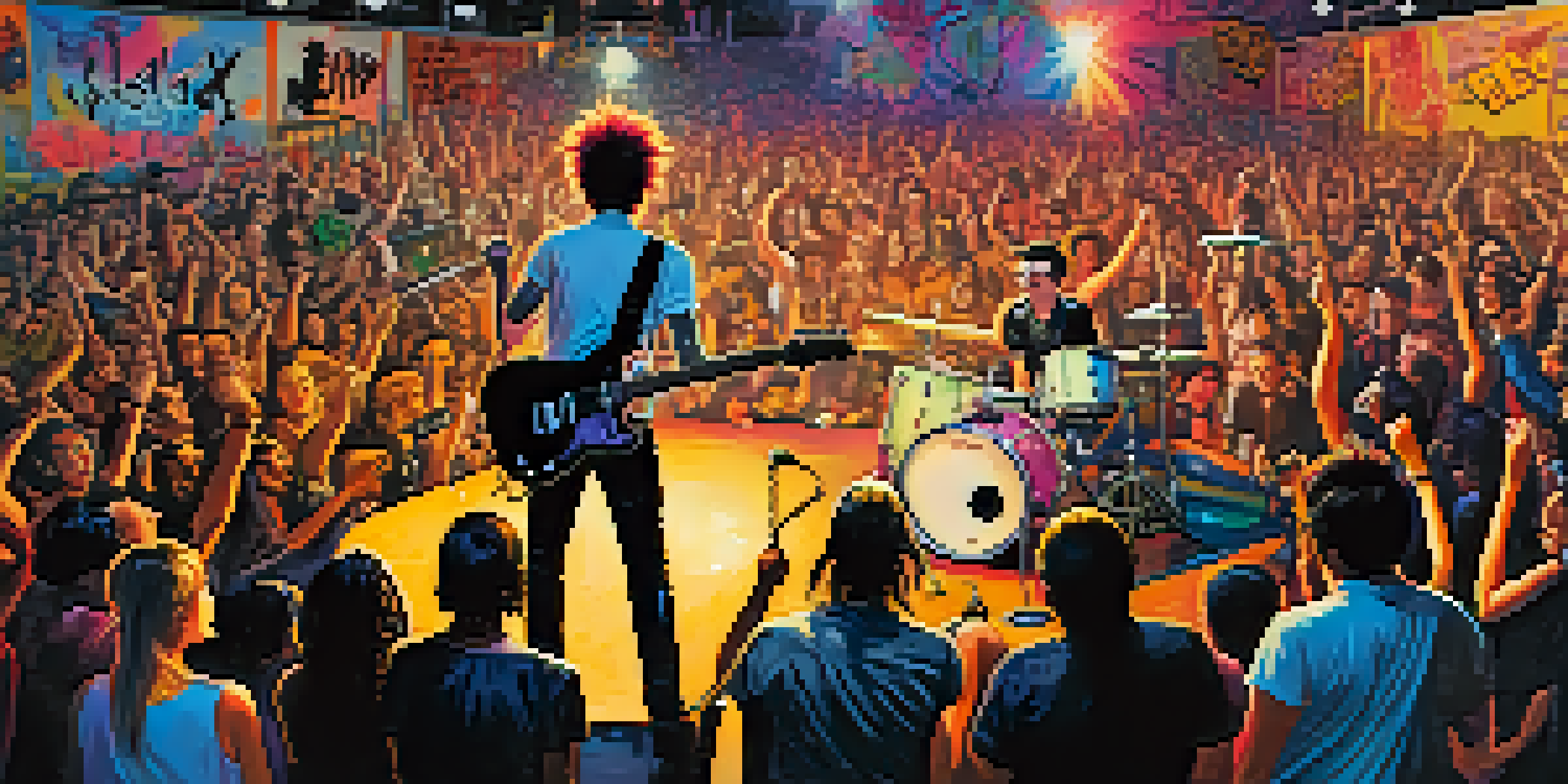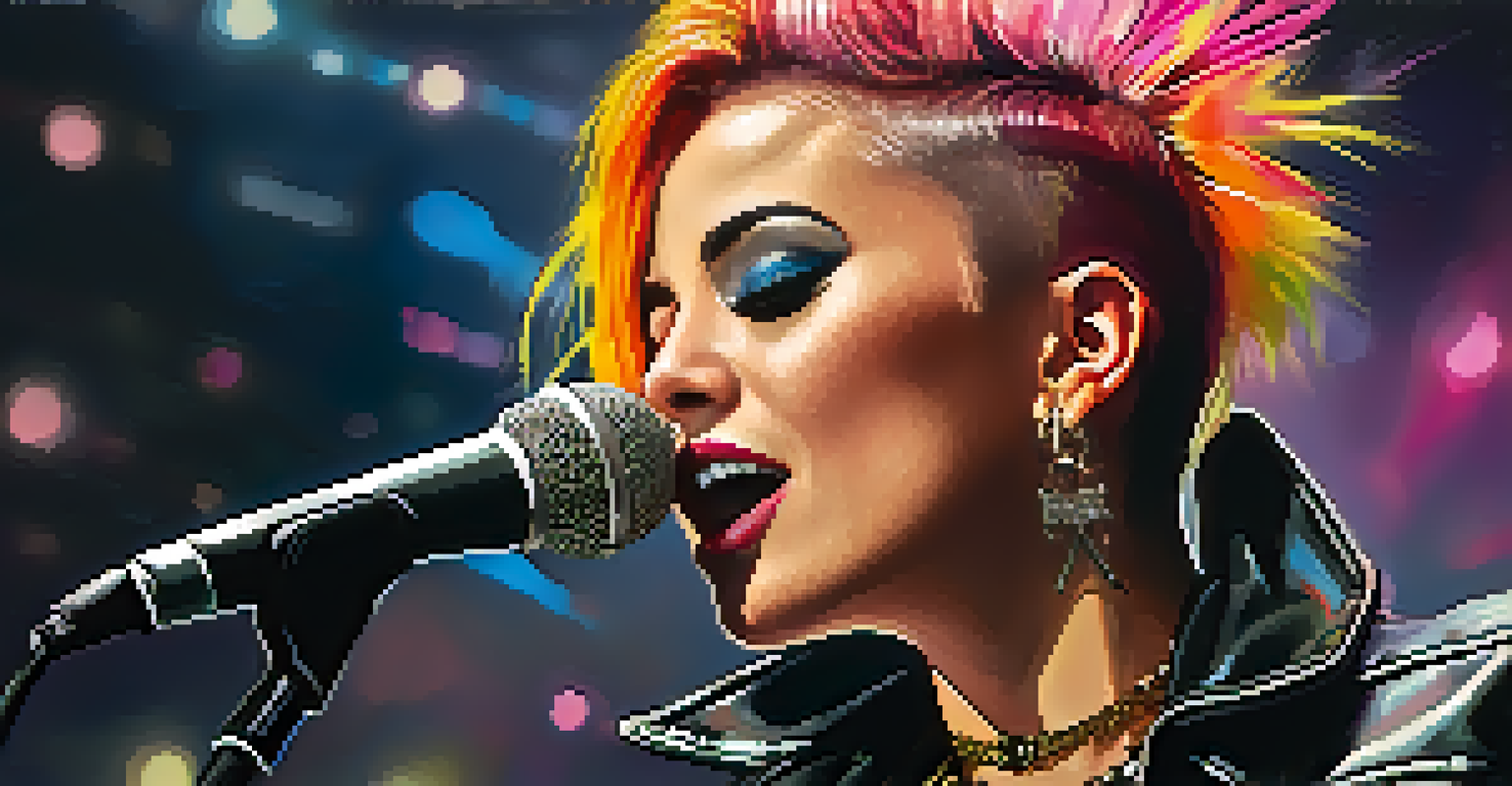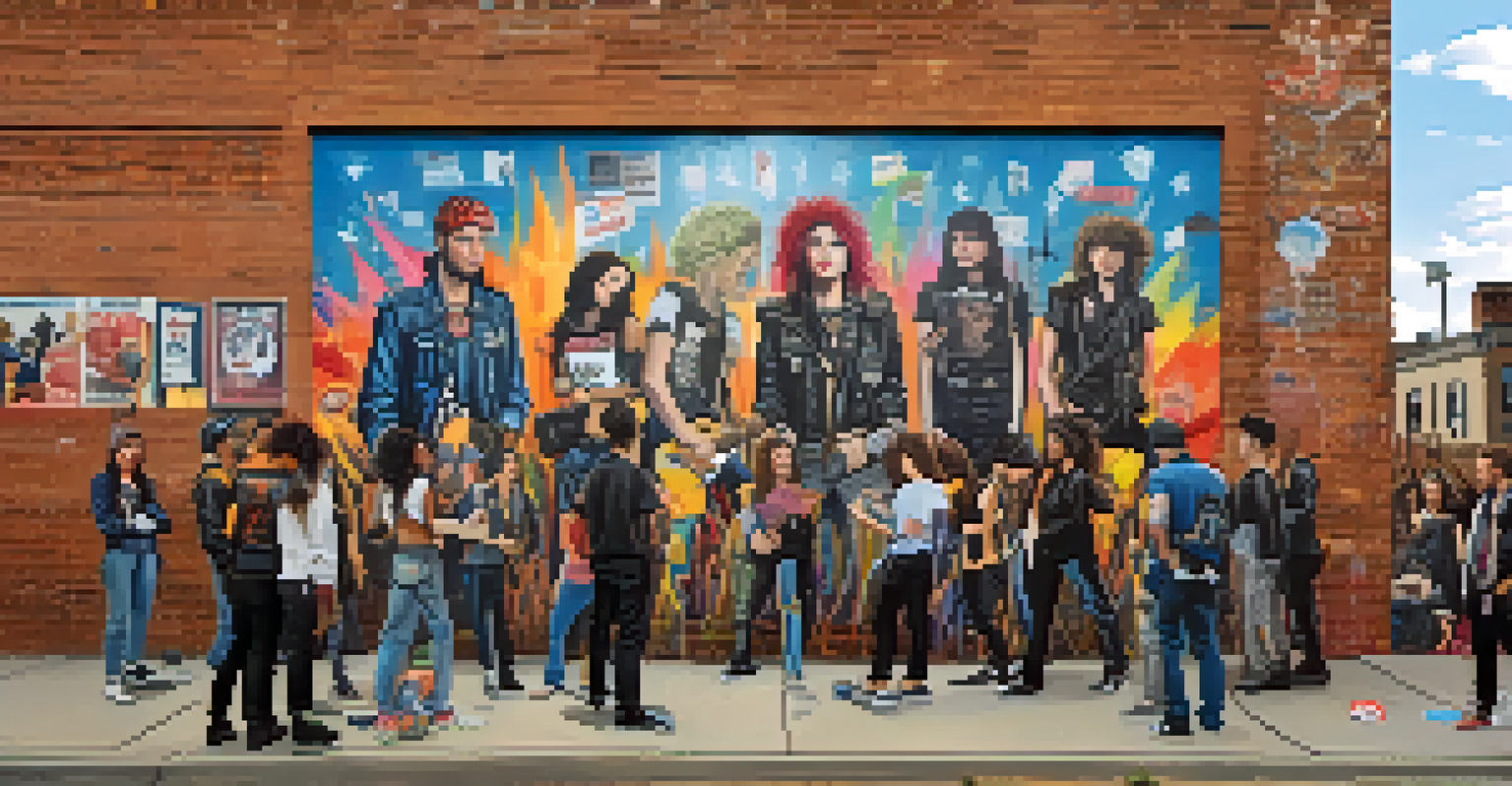Punk Rock and Political Identity: A Voice for the Marginalized

The Roots of Punk Rock: A Rebellion Against Conformity
Punk rock emerged in the 1970s as a raw and energetic response to the mainstream music scene. It was more than just a musical genre; it was a cultural movement that questioned societal norms and values. Bands like The Ramones and Sex Pistols embodied this spirit of rebellion, rejecting polished sounds and opting for a more authentic, gritty approach. This ethos of defiance resonated deeply with those feeling marginalized in society, creating a unique bond between the music and its listeners.
Punk is not dead. It just smells funny.
As punk rock evolved, its lyrics began to reflect the struggles of everyday people, particularly those who felt alienated or oppressed. The music became a voice for the voiceless, addressing issues such as poverty, inequality, and government corruption. This connection with social issues set punk apart from other genres, establishing it as not just entertainment but a platform for political discourse. Fans were drawn to its authenticity, finding solace in the shared experiences the music articulated.
Ultimately, punk rock became a rallying cry for those craving change. Its emphasis on individuality and nonconformity inspired listeners to express their own identities and resist societal pressures. This rebellious spirit laid the groundwork for punk’s enduring legacy as a genre that champions the marginalized and encourages political engagement.
Lyrics as a Medium: Telling Untold Stories
The power of punk rock lies heavily in its lyrics, which often serve as a direct commentary on social and political issues. Bands like The Clash and Dead Kennedys tackled topics such as war, racism, and police brutality, using their music to shine a light on injustices that many preferred to ignore. This fearless approach not only resonated with fans but also sparked conversations in broader society about these pressing issues.

By amplifying the voices of the marginalized, punk rock has created an environment where artists can share their stories without fear of censorship. Lyrics become a vehicle for expressing frustration, pain, and hope, making the genre a crucial outlet for those feeling unheard. For example, the song 'White Riot' by The Clash urges listeners to fight against oppression, showcasing the genre's commitment to activism.
Punk Rock: A Voice for the Voiceless
Punk rock emerged as a cultural movement that amplified the struggles of marginalized individuals, addressing societal issues and inspiring political engagement.
Moreover, punk rock's DIY ethic empowers musicians to produce their own content and share it through independent channels. This democratization of music enables diverse voices to emerge, further enriching the punk landscape. As a result, punk not only tells the stories of the marginalized but inspires a new generation to take up the mantle of activism through artistic expression.
Punk Icons: Figures Who Redefined Political Activism
Throughout its history, punk rock has produced iconic figures who have transcended music to become powerful advocates for change. Artists like Patti Smith and Jello Biafra have used their platforms to promote social justice, environmentalism, and free speech. Their influence illustrates how punk rock can serve as a conduit for broader cultural movements, inspiring fans to engage with political issues actively.
The more you ignore me, the closer I get.
Patti Smith, often referred to as the 'Godmother of Punk,' has long championed women's rights and equality through her music and poetry. Her song 'Because the Night' not only showcases her artistic prowess but also reflects the yearning for connection that resonates deeply with marginalized communities. By embracing her identity and experiences, she has empowered countless individuals to speak out against oppression.
Similarly, Jello Biafra of the Dead Kennedys is known for his outspoken political activism, particularly regarding government corruption and censorship. His work reminds fans that punk rock is not just about the music but also about fostering a culture of resistance. These punk icons demonstrate that musicians can wield significant power in shaping political discourse and empowering marginalized voices.
Global Punk: A Worldwide Movement for Change
While punk rock originated in the West, its influence has spread globally, inspiring movements in various countries. Each region has adapted the genre to reflect its unique social and political landscape, proving that punk is a universal language of resistance. From Latin America to Eastern Europe, punk rock has become a rallying cry for those fighting against oppression and injustice.
In countries like Brazil, punk has been a voice against governmental corruption and social inequality, with bands like Os Mutantes highlighting local struggles. Meanwhile, in Eastern Europe, punk has played a crucial role in anti-communist movements, with musicians using their art to galvanize support for democratic reforms. This global reach underscores punk's ability to resonate across cultures and inspire collective action.
Global Punk: A Unified Resistance
Punk rock has transcended its Western origins, becoming a worldwide movement that adapts to local struggles while fostering a sense of solidarity among activists globally.
Importantly, global punk communities often collaborate and support one another, creating a vast network of activists. This interconnectedness amplifies their message, demonstrating that the fight for social justice knows no borders. Punk rock remains a powerful tool for those advocating for change, uniting marginalized voices around the world.
Gender and Sexuality in Punk: Breaking Boundaries
Punk rock has long been a space for challenging traditional gender roles and exploring sexuality. Female punk musicians, such as Joan Jett and Brody Dalle, have defied expectations, carving out their own identities in a male-dominated industry. Their presence has not only broadened the genre but also empowered women to express themselves authentically and unapologetically.
The punk scene has historically provided a platform for LGBTQ+ voices, allowing individuals to challenge societal norms surrounding gender and sexuality. Bands like Pansy Division openly addressed queer issues, fostering a sense of belonging for marginalized groups within the punk community. This inclusivity has made punk a safe haven for those seeking acceptance and understanding.
Moreover, punk rock's rejection of conformity extends to its approach to fashion and presentation, encouraging self-expression in all forms. This has led to a vibrant culture where individuals can explore their identities without fear of judgment. By celebrating diversity, punk rock has become synonymous with the fight for gender and sexual equality, proving that music can be a powerful tool for social change.
Punk Activism: Beyond the Music
Punk rock's influence extends far beyond the music itself, as many musicians actively engage in various forms of activism. From organizing benefit concerts to participating in protests, punk artists often use their platforms to advocate for social change. This commitment to activism distinguishes punk from other genres, reinforcing its role as a voice for the marginalized.
For instance, the band Anti-Flag has consistently used their music to address political issues, but they also engage in grassroots activism, encouraging fans to participate in local movements. Their approach exemplifies how punk musicians can inspire their audiences to take action, fostering a culture of activism within the punk community. This hands-on engagement amplifies the impact of their music, transforming it into a catalyst for change.
Empowering Diversity in Punk
The punk genre challenges traditional norms, embracing diverse identities and promoting gender and sexual equality through its music and culture.
Moreover, many punk bands collaborate with non-profit organizations, using their popularity to raise awareness and funds for important causes. By aligning their music with social justice initiatives, they further solidify punk's identity as a movement dedicated to uplifting marginalized voices. This synergy between music and activism proves that punk rock is not just a genre but a way of life for many who seek to effect positive change.
The Future of Punk: Continuing the Fight for Equality
As the world faces ongoing social and political challenges, punk rock remains a vital force for change. New generations of musicians are emerging, bringing fresh perspectives and experiences to the genre. This evolution ensures that punk continues to resonate with those feeling marginalized, encouraging them to raise their voices and challenge the status quo.
Today's punk bands are increasingly diverse, reflecting a wider array of experiences and identities. This inclusivity enriches the genre, allowing it to address issues such as racial justice, environmentalism, and mental health. By embracing these themes, contemporary punk not only honors its roots but also adapts to the changing landscape of activism.

Ultimately, the future of punk rock lies in its ability to inspire and mobilize listeners. As long as there are voices fighting for equality, punk will continue to be a powerful platform for the marginalized. Through music, art, and activism, punk rock will undoubtedly remain a driving force in the quest for social justice.